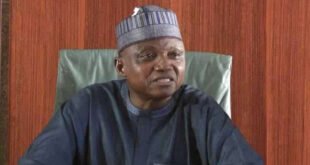Britain awoke on Friday to the scene of a political earthquake. The opposition Labour Party, after 14 years in the political wilderness, inflicted a brutal defeat on the ruling Conservatives.
It is now certain that party leader Keir Starmer will become prime minister in the next few hours, replacing his Conservative Party counterpart, Rishi Sunak, who presided over one of the worst election defeats in British political history.
“We did it,” Starmer told a cheering crowd in a morning speech in central London. “You voted for this and now it has arrived. Change starts now.”
He thanked the voters, saying they had changed Britain.
“A weight has been lifted, a burden has finally been lifted from the shoulders of this great nation, and now we can look forward again,” he said.
As election night wound into the early hours, the scale of Labour’s victory became clearer. A reliable exit poll published on Thursday night found that Labour was on track to win 410 seats, just eight short of its highest-ever total. The Conservatives were forecast to win just 131 seats, which would have been their worst showing in their nearly 200-year history.
Labour’s victory was confirmed around 5 a.m. local time (12 a.m. ET), when it secured the 326 seats needed for a parliamentary majority. The exact extent of its victory is still being determined as vote counting continues across the country.
Polls had predicted a catastrophic election for the Conservatives, who would win their smallest number of seats in their history, 131.
Unlike the US, Britain does not have a months-long transition.
On Friday morning, Starmer will travel to Buckingham Palace to be appointed prime minister by King Charles III, a formality required under Britain’s constitutional monarchy.
News helicopters will follow his car as it winds through London’s ancient streets, flanked by police guards. It will be Charles’s first post-election prime ministerial appointment, a private meeting that usually lasts just 30 minutes.
His mother, Queen Elizabeth II, saw 15 leaders succeed each other during her 70-year reign.
Meanwhile, Sunak and his family will leave 10 Downing St., where the prime minister lives and works. Traditionally, the outgoing leader leaves a handwritten note wishing his successor good luck.
The Starmers will move in shortly after, and Starmer will deliver his first address to the nation as prime minister, sitting at a lectern outside the residence’s famous black door.
He will probably acknowledge that things will not be easy for the Labour Party.
The party inherits a stagnant economy, crumbling public services, rising child poverty and homelessness, and a National Health Service that, though taxpayer-funded and beloved, has become decrepit and dysfunctional.
Meanwhile, prisons are about to overflow, and some city and county governments are about to declare bankruptcy or have already done so. Several colleges also appear destined to fail.
The party itself has potential problems, too. Polls and interviews suggest that many voters were not motivated by a love of Labour, but rather by a desire to punish the Conservatives for 14 years of scandals and policy missteps. This raises the prospect that Labour’s support, while broad, could be shallow and fragile, and shatter as easily as it was formed.
Labour victories, especially landslides, are rare in British politics, which has been dominated by the Conservative Party since the Second World War. In its 120 years, Labour has been in power for just over 30 of them. And since the war, only three of its leaders have beaten the Conservatives, the last of whom was Tony Blair in 2005.
The Labour Party is traditionally seen as a centre-left party. But like Blair, Starmer has moved towards the middle ground.
He has stuck closely to some conservative policies, vowing to control budget spending and not raise taxes, and speaking tough on immigration and social security. He has not been afraid to use the Union flag and other images that resonate with older and more socially conservative voters, even though many younger and left-leaning voters find them banal and nationalistic.
Some commentators have criticised Starmer, accusing him of being too cautious and even timid, given the scale of the challenges Britain faces both domestically and internationally.
The most likely possibility is that he will have to work with former President Donald Trump, not exactly a natural bedfellow for a self-proclaimed socialist.
He has made clear that he will work with whoever wins the presidency in November, although that relationship is likely to be made more awkward by comments made by his foreign policy chief in 2018.
David Lammy, then still an ordinary lawmaker, called Trump a “woman-hating, Nazi-sympathetic, neo-Nazi sociopath” and a “profound threat to the international order.”
Aware of the possibility of this impending transatlantic relationship, Starmer distanced himself from Lammy’s comments last week.
“I know that the job of the person who leads our country is to deal with the leaders of other countries, who are elected by their people,” he told the BBC. “You don’t always choose the leaders of other countries.”
The UK has long touted its “special relationship” with Washington, and President Joe Biden, who is certainly closer to Labour’s politics and governing style, has called London his closest ally.
On defense, Starmer mirrored the Conservatives’ pledge to increase military spending to 2.5% of the country’s gross domestic product, a slight increase from last year and above the 2% target recommended by NATO. But with fears that Russia’s invasion of Ukraine could one day spread to other parts of Europe, military officials say Britain’s armed forces remain dangerously stretched thin.
Rob Johnson, until recently the official in charge of assessing Britain’s military strength, told the Financial Times this week that the UK was unprepared for “conflict of any scale” and was operating at the “bare minimum” for peacekeeping and humanitarian operations.
One of Trump’s main criticisms of Europe is that it has for too long relied on American military power to protect itself from Russia.
On the environment, the Labour Party says it will not grant new oil and gas licences and promises to roll out green energy across Britain. However, the charity Greenpeace says their “investment in the green transition is not enough”.
On China, the party is likely to continue the policy of strategic ambiguity that characterizes all major European powers. They routinely criticize Beijing’s human rights record, while acknowledging that their economies would collapse without trade with China. [NBC News]
The post Britain wakes up to find new government as Labour wins landslide election appeared first on TheConclaveNg.
 JamzNG Latest News, Gist, Entertainment in Nigeria
JamzNG Latest News, Gist, Entertainment in Nigeria









